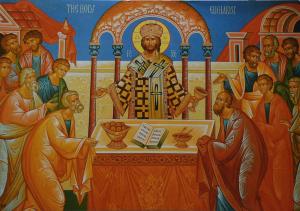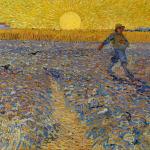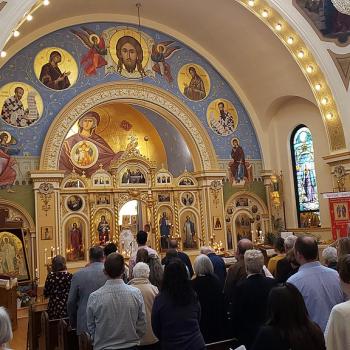
Food is what we take into ourselves for nourishment, that is, it is what we consume in order to receive the nutrients we need to maintain our life. The more we live, the more we grow, the more energy we use, the more food we will need. When we eat, we take something which is outside ourselves and find a way to incorporate into our bodies. The process is imperfect. It is very wasteful. We have to take the life from other living things in order to have our life maintained. Sadly, much of what we take in, we cannot use, and so will be expelled as waste. The perfect food would be that which we can partake of without destroying, and as we partake of it, nothing is lost, it is all capable of being incorporated into us without waste, all the while providing us all the sustenance we need. This is what Jesus promises to give us:
For my flesh is food indeed, and my blood is drink indeed. He who eats my flesh and drinks my blood abides in me, and I in him. As the living Father sent me, and I live because of the Father, so he who eats me will live because of me. This is the bread which came down from heaven, not such as the fathers ate and died; he who eats this bread will live for ever (Jn. 6:55-58 RSV).
We must not interpret what Jesus said with a brutal, materialistic, and therefore, cannibalistic understanding. What he said is true. Jesus, in his whole person, is being offered to us, but Jesus does so sacramentally, with a sacramental, not physical presence. That is, he comes to us in a form which is not physically flesh and blood, though the essence of what we eat is Jesus in his totality, including his flesh and blood. Thus, Jesus was telling us that he can be taken in by us, eaten, as it were by us, so that all that we need for eternal life can be and will be supplied by him. He is himself the perfect food. We take him fully into ourselves, incorporating him into our very selves, every time we partake of him in the eucharist. But, as St. Albert the Great notes, because he is perfect food, we must not think that we are taking in something different each and every time we partake of communion, but rather, we are partaking of the one, singular eschatological feast:
But this food, since it will never lose the power pf [true] food through any corruption, feeds in such a way that hunger for another does not return, but it is the desire of the saints that this food may continue in them, and that, in the repeated sacramental reception, the food may not be taken again but that the same which was received before may continue. [1]
This is the purpose communion: to feed us, to give us what we need for eternal life. It is given to us in the physical form of bread and wine because seeing bread and wine should help remind us that we are partaking spiritual food, that is, the supersubstantial bread of life. The physical experience, to be sure, is of ordinary food, as the physical form (accidents) of bread and wine remain. Our body acts as it does when we eat bread, and drink wine, but our person receives something far more, that is, our true food, Christ himself. While the physical forms of bread and wine will disappear, what we have incorporated ourselves through those forms will remain with us. For, by partaking of communion, we incorporate Christ into ourselves. But here, there is something marvelous which happens. Instead of Christ being transformed into us, we are transformed into him, that is, we become a part of his body, and in this way, we find ourselves moving beyond ourselves and in unity with him. “He remains, he says, in me, transported outside himself, and I remain in him, transported outside myself.”[2] As we become a part of his body, it can be said that Christ feeds on us, though here, we must understand, Jesus does so in a way which transforms the eating process because Christ does not feed upon us in order to nourish himself, but rather, to have us die to the self, from the barriers our egotistically-driven understanding of being provide us, so that we can join in with and be one with the whole of creation through our incorporation into him. Then, by being made a part of him, a part of his mystical body, we find our lives are brought into the divine life itself, whereupon we find ourselves being deified. Thus, after dying to the self, we find we are raised up and transformed into something greater:
“The union of Christ in the divinity has indicated to us the mystery of the unity of Christ.” This is the mystery: that all creation by means of one, has been brought near to God in a mystery. Then it is transmitted to all. Thus all is united in Him as the members in a body; He however is the head of all. This action was performed for all of creation. There will, indeed, be a time when no part will fall shot of the whole. For it is not just a matter of this great spiritual intelligence being transmitted only partially, but He will do something greater, once He has made <this> manifest and has indicated it here below. [3]
All things are to be united as one, finding themselves one with each other through their unity with Christ. The eucharist is one means by which this is made possible. The eucharist is food; its is given out to be eaten. Its purpose is to make us one with Christ, not to keep him separate from us (which can be a problem when we ignore the primary purpose of the eucharist, and make it primarily something to worship instead of eat). Jesus offers himself as food he can transform us from within and make us a part of himself:
The ever-existing good desires to give himself to us as food in order to transform us into what he is. “My flesh is food indeed, and my blood is drink indeed” [Jn 6.55]. Thus the person who loves this flesh is not sensual, and he who is well disposed to this blood will be cleansed from physical blood. The Word’s flesh and blood of the person in this flesh do not constitute one grace only; rather, it is sweet for whomever tastes it, yearned for by whomever desires it and lusted after [erasmion] by whoever loves it [agaposin]. [4]
Due to the fall, due to sin, we have cut ourselves off from each other, indeed, from the world. Using our personal existence, we create an individualized notion of the self which then serves as a barrier between ourselves and everyone and everything else. We have lost God as the center of our being, replacing God with the false-self which we have imposed over our personal being. The eucharist works in relation to that problem by first coming to us, and then working within us to help us overcome that barrier we established so that we can then re-center ourselves on God. Then, we will find, with God as the center of our being, in and through our unity with Christ, we will no longer have any barrier between us and others so we can be united with all things (that is, in communion with all things). This is not to say we will be absorbed by Christ in such a way that our personal existence will then come to naught, but rather, the false self, the barrier which we created based upon a bad engagement with our personal existence, will vanish, so that we can then be true to our person and find that it is as persons we not only exist, but as persons in Christ we find our true purpose and glory.
[1] St. Albert the Great, On the Body of the Lord. Trans. Sr. Albert Marie Surmanski, OP (Washington, DC: CUA Press, 2017), 133.
[2] St. Albert the Great, On the Body of the Lord, 45.
[3] St. Isaac the Syrian, “The Third Part.” Trans. Mary T. Hansbury in An Anthology of Syriac Writers From Qatar in the Seventh Century. Ed. Mario Kozah, Abdulrahim Abu-Husayn, Saif Shaeen Al-Murikhi and Haya Al Thani (Piscataway, NJ: Gorgias Press, 2015), 322-3 [V.10].
[4] St. Gregory of Nyssa, Homilies on Ecclesiastes. Trans. Richard McCambly. Ed. John Litteral (Ashland, KY: Litteral’s Christian Library Publications, 2014), 74 [Homily 8].
Stay in touch! Like A Little Bit of Nothing on Facebook.
If you liked what you read, please consider sharing it with your friends and family!
N.B.: While I read comments to moderate them, I rarely respond to them. If I don’t respond to your comment directly, don’t assume I am unthankful for it. I appreciate it. But I want readers to feel free to ask questions, and hopefully, dialogue with each other. I have shared what I wanted to say, though some responses will get a brief reply by me, or, if I find it interesting and something I can engage fully, as the foundation for another post. I have had many posts inspired or improved upon thanks to my readers.













